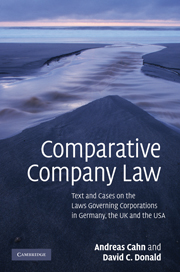 Comparative Company Law
Comparative Company Law Book contents
- Frontmatter
- Contents
- List of figures
- List of tables
- Preface and acknowledgments
- Glossary
- List of abbreviations
- Table of cases
- Table of legislation
- PART I The essential qualities of the corporation
- PART II The corporation and its capital
- PART III Governing the corporation
- SUBPART A The management
- SUBPART B The members
- 16 Shareholder voting rights
- 17 Shareholder information rights
- 18 Shareholder meetings
- 19 Shareholder duties
- 20 Judicial enforcement of shareholder rights
- PART IV Corporate combinations, groups and takeovers
- References
- Index
19 - Shareholder duties
from SUBPART B - The members
- Frontmatter
- Contents
- List of figures
- List of tables
- Preface and acknowledgments
- Glossary
- List of abbreviations
- Table of cases
- Table of legislation
- PART I The essential qualities of the corporation
- PART II The corporation and its capital
- PART III Governing the corporation
- SUBPART A The management
- SUBPART B The members
- 16 Shareholder voting rights
- 17 Shareholder information rights
- 18 Shareholder meetings
- 19 Shareholder duties
- 20 Judicial enforcement of shareholder rights
- PART IV Corporate combinations, groups and takeovers
- References
- Index
Summary
Required reading
EU: Transparency Directive, arts. 9–13
D: WpHG, §§ 21, 22; AktG, §§ 20, 21
UK: CA 2006, secs. 791–797; FSA Disclosure and Transparency Rules, Rule 5
US: Exchange Act, §§ 13(d), 16(a); Exchange Act Rule 13d-1, 13d-3, 16a-2, 3, 6
The fiduciary and reporting duties of shareholders
In the preceding three chapters, we discussed shareholder rights and how they are exercised. Shareholders have the right to vote on important decisions affecting the company and to receive information on which to base their voting decisions. Voting takes place primarily in general meetings, which must be called and held in certain ways to ensure transparency and fairness. In this chapter, we examine shareholder duties. Here, we will look at the duty to disclose large shareholdings and to exercise voting power with a certain degree of loyalty vis-à-vis the shareholders affected by this power. In the next chapter, we will discuss how minority shareholders can have recourse to court to defend rights that they are not able to protect in the general meeting because of the insufficiency of their voting power.
The duties discussed in this chapter fall into two quite different categories. On the one hand, courts have developed duties that apply to limit the power which shareholders have under the law. These duties resemble the duty of loyalty that applies to corporate directors.
- Type
- Chapter
- Information
- Comparative Company LawText and Cases on the Laws Governing Corporations in Germany, the UK and the USA, pp. 574 - 598Publisher: Cambridge University PressPrint publication year: 2010


